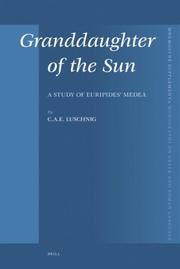| Listing 1 - 1 of 1 |
Sort by
|

ISBN: 9004160590 9789004160590 9786612397523 1282397524 9047420144 9789047420149 9781282397521 6612397527 Year: 2007 Volume: 286. Publisher: Leiden Boston
Abstract | Keywords | Export | Availability | Bookmark
 Loading...
Loading...Choose an application
- Reference Manager
- EndNote
- RefWorks (Direct export to RefWorks)
This book attempts to view Medea in a positive light: looking not just at her failed relationships, but also at her successful ones and commenting on her intellect rather than just her clever manipulations of men. It tries to see her (or her author, who brings Medea home to Athens), as something of a political hero. The work considers the multiple facets of Medea, as the ideal wife, as a loving mother, as a woman among women, and how Medea becomes the author of her own story. The author asks what Medea is in the last scene: a demon or one of us; how she relates to the city-state; why this heroic drama is presented through the voices of two slaves.
Medea (Greek mythology). --- Euripides. --- Criticism and interpretation. --- Medea (Greek mythology) --- Medea (Greek mythology) in literature --- Médée (Mythologie grecque) dans la littérature --- Medea, --- In literature. --- Medea (Euripides). --- Euripides, --- Medea (Euripides) --- Euripides. - Medea - Criticism and interpretation. --- Euripide (0480-0406 av. J.-C.). Médée --- Critique et interprétation --- Euripides. - Medea --- Medea, consort of Aegeus, King of Athens (Mythological character) --- Euripide (0480-0406 av. J.-C.). Médée --- Critique et interprétation
| Listing 1 - 1 of 1 |
Sort by
|

 Search
Search Feedback
Feedback About UniCat
About UniCat  Help
Help News
News